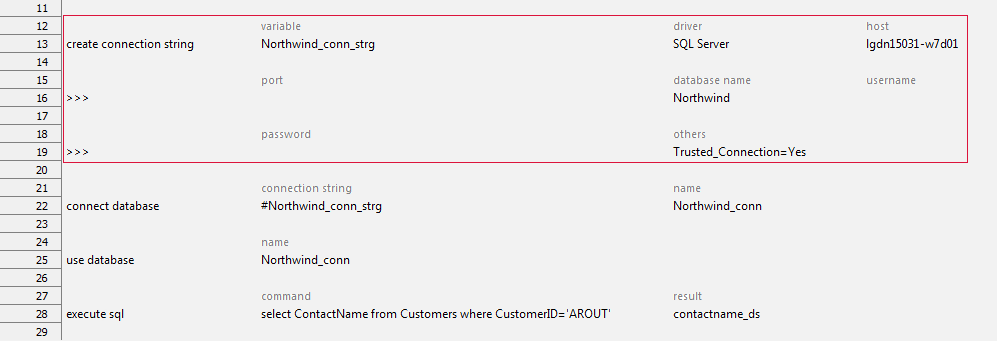create connection string
Description
Generate a connection string to a specified database.
Arguments
variable
(Optional) Name of variable to receive the returned connection string.
driver
(Optional) Name of the ODBC driver specified for the current connection.
host
(Use only for DBMS sources, not Excel) DBMS server hostname or IP address. (Optionally, an instance name may also be appended, preceded with a backslash. Example: myhost\myinstance.)
port
(Optional for DBMS sources; not used for Excel) Port of DBMS server. (Defaults: MSSQL use port 1433; MySQL uses port 3306.)
database name
(Optional) Name of database to be connected to.
username
(Optional) Username with which to log on to database.
password
(Optional) Password for database account specified by username.
others
(Optional) Other connection string parameter(s) applicable to the host DBMS, in the form of key-value pairs separated by semicolons.
Notes
This action is generally invoked as part of a sequence of actions to allow the test to access a data source. (See Testing with databases for more information.)
The nature of a connection string – that is, the parameters that apply to it – is specific to the type of data source that it targets. More information on connection strings is available from the website www.connectionstrings.com/.
If connecting to a MySQL database:
- If any of the associated execute sql calls are to contain multiple queries in their command arguments, the others argument must include the setting
Option=67108864;. - If creating a Unicode-supported connection with the FreeTDS ODBC driver, others must contain
ClientCharset=UTF-8;.
- If any of the associated execute sql calls are to contain multiple queries in their command arguments, the others argument must include the setting
Use of a data source name (DSN) is supported. DSNs may be specified in the others argument with the following formats:
- User and System DSNs:
DSN=myDsn; - File DSNs:
FILEDSN=c:\myDsnFile.dsn;(Refer to Creating a Data Source Name (DSN) in Windows for further details.)
- User and System DSNs:
If the variable in argumentvariablehas not been declared, the action creates it as a global.
If the variable argument is left empty, TestArchitect supplies a global variable with the name _result.
This action supports the <ignore> modifier. If the string
<ignore>is present as the value of any of the arguments, or any argument contains an expression that evaluates to<ignore>, the action is skipped during execution.
Applicable Built-In Settings
The following settings are applicable to this action: remove double quotes from cell.
Applicable Controls
This action is applicable to the following controls: none.
Example
The following example illustrates the process of connecting to, and using, a database from within a test, of which creating a connection string is the first step.
Action Lines
Result
Related concepts
